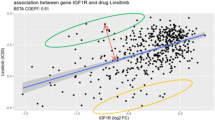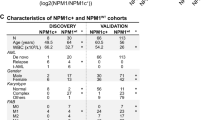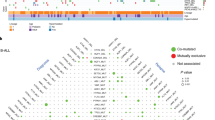Abstract
AZD1152 is a highly selective Aurora B kinase inhibitor currently undergoing Phase I and II clinical evaluation in patients with acute myelogenous leukemia and advanced solid malignancies. We have established two AZD1152-resistant cell lines from SW620 colon and MiaPaCa pancreatic carcinoma lines, which are >100-fold resistant to the active metabolite of AZD1152, AZD1152 HQPA and interestingly, cross-resistant to the pan-Aurora kinase inhibitor, VX-680/MK0457. Using whole-genome microarray analysis and comparative genomic hybridization, we were able to identify MDR1 and BCRP as the causative genes that underlie AZD1152 HQPA-resistance in these models. Furthermore, the upregulation of either of these genes is sufficient to render in vivo tumor growth insensitive to AZD1152. Finally, the upregulation of MDR1 or BCRP is predictive of tumor cell sensitivity to this agent, both in vitro and in vivo. The data provide a genetic basis for resistance to Aurora kinase inhibitors, which could be utilized to predict clinical response to therapy.
This is a preview of subscription content, access via your institution
Access options
Subscribe to this journal
Receive 6 print issues and online access
$259.00 per year
only $43.17 per issue
Buy this article
- Purchase on Springer Link
- Instant access to full article PDF
Prices may be subject to local taxes which are calculated during checkout









Similar content being viewed by others
Accession codes
References
Carmena M, Earnshaw WC . The cellular geography of aurora kinases. Nat Rev Mol Cell Biol 2003; 4: 842–854.
Ducat D, Zheng Y . Aurora kinases in spindle assembly and chromosome segregation. Exp Cell Res 2004; 301: 60–67.
Marumoto T, Zhang D, Saya H . Aurora-A—a guardian of poles. Nat Rev Cancer 2005; 5: 42–50.
Andrews PD, Knatko E, Moore WJ, Swedlow JR . Mitotic mechanics: the auroras come into view. Curr Opin Cell Biol 2003; 15: 672–683.
Kimmins S, Crosio C, Kotaja N, Hirayama J, Monaco L, Höög C et al. Differential functions of the Aurora-B and Aurora-C kinases in mammalian spermatogenesis. Mol Endocrinol 2007; 21: 726–739.
Ditchfield C, Johnson VL, Tighe A, Ellston R, Haworth C, Johnson T et al. Aurora B couples chromosome alignment with anaphase by targeting BubR1, Mad2, and Cenp-E to kinetochores. J Cell Biol 2003; 161: 267–280.
Harrington EA, Bebbington D, Moore J, Rasmussen RK, Ajose-Adeogun AO, Nakayama T et al. VX-680, a potent and selective small-molecule inhibitor of the Aurora kinases, suppresses tumor growth in vivo. Nat Med 2004; 10: 262–267.
Hauf S, Cole RW, LaTerra S, Zimmer C, Schnapp G, Walter R et al. The small molecule Hesperadin reveals a role for Aurora B in correcting kinetochore-microtubule attachment and in maintaining the spindle assembly checkpoint. J Cell Biol 2003; 161: 281–294.
Manfredi MG, Ecsedy JA, Meetze KA, Balani SK, Burenkova O, Chen W et al. Antitumor activity of MLN8054, an orally active small-molecule inhibitor of Aurora A kinase. Proc Natl Acad Sci USA 2007; 104: 4106–4111.
Mortlock AA, Foote KM, Heron NM, Jung FH, Pasquet G, Lohmann JJ et al. Discovery, synthesis, and in vivo activity of a new class of pyrazoloquinazolines as selective inhibitors of aurora B kinase. J Med Chem 2007; 50: 2213–2224.
Wilkinson RW, Odedra R, Heaton SP, Wedge SR, Keen NJ, Crafter C et al. AZD1152, a selective inhibitor of Aurora B kinase, inhibits human tumor xenograft growth by inducing apoptosis. Clin Cancer Res 2007; 13: 3682–3688.
Pallis M, Russell N . Strategies for overcoming p-glycoprotein-mediated drug resistance in acute myeloblastic leukaemia. Leukemia 2004; 18: 1927–1930.
van der Holt B, Löwenberg B, Burnett AK, Knauf WU, Shepherd J, Piccaluga PP et al. The value of the MDR1 reversal agent PSC-833 in addition to daunorubicin and cytarabine in the treatment of elderly patients with previously untreated acute myeloid leukemia (AML), in relation to MDR1 status at diagnosis. Blood 2005; 106: 2646–2654.
Trock BJ, Leonessa F, Clarke R . Multidrug resistance in breast cancer: a meta-analysis of MDR1/gp170 expression and its possible functional significance. J Natl Cancer Inst 1997; 89: 917–931.
Bates SF, Chen C, Robey R, Kang M, Figg WD, Fojo T . Reversal of multidrug resistance: lessons from clinical oncology. Novartis Found Symp 2002; 243: 83–96.
Girdler F, Sessa F, Patercoli S, Villa F, Musacchio A, Taylor S . Molecular basis of drug resistance in aurora kinases. Chem Biol 2008; 15: 552–562.
Twentyman PR, Bleehen NM . Resistance modification by PSC-833, a novel non-immunosuppressive cyclosporin. Eur J Cancer 1991; 27: 1639–1642.
Boesch D, Gavériaux C, Jachez B, Pourtier-Manzanedo A, Bollinger P, Loor F . In vivo circumvention of P-glycoprotein-mediated multidrug resistance of tumor cells with SDZ PSC 833. Cancer Res 1991; 51: 4226–4233.
Smith AJ, van Helvoort A, van Meer G, Szabo K, Welker E, Szakacs G et al. MDR3 P-glycoprotein, a phosphatidylcholine translocase, transports several cytotoxic drugs and directly interacts with drugs as judged by interference with nucleotide trapping. J Biol Chem 2000; 275: 23530–23539.
Rabindran SK, Ross D, Doyle LA, Yang W, Greenberger LM . Fumitremorgin C reverses multidrug resistance in cells transfected with the breast cancer resistance protein. Cancer Res 2000; 60: 47–50.
Ding S, Chamberlain M, McLaren A, Goh L, Duncan I, Wolf CR . Cross-talk between signalling pathways and the multidrug resistant protein MDR-1. Br J Cancer 2001; 85: 1175–1184.
Litman T, Brangi M, Hudson E, Fetsch P, Abati A, Ross DD et al. The multidrug-resistant phenotype associated with overexpression of the new ABC half-transporter, MXR (ABCG2). J Cell Sci 2000; 113: 2011–2021.
Gizatullin F, Yao Y, Kung V, Harding MW, Loda M, Shapiro GI . The Aurora kinase inhibitor VX-680 induces endoreduplication and apoptosis preferentially in cells with compromised p53-dependent postmitotic checkpoint function. Cancer Res 7668-77; 66: 7668–7677.
Wang YC, Juric D, Francisco B, Yu RX, Duran GE, Chen GK et al. Regional activation of chromosomal arm 7q with and without gene amplification in taxane-selected human ovarian cancer cell lines. Genes Chromosomes Cancer 2006; 45: 365–374.
Turton NJ, Judah DJ, Riley J, Davies R, Lipson D, Styles JA et al. Gene expression and amplification in breast carcinoma cells with intrinsic and acquired doxorubicin resistance. Oncogene 2001; 20: 1300–1306.
Chen YN, Mickley LA, Schwartz AM, Acton EM, Hwang JL, Fojo AT . Characterization of adriamycin-resistant human breast cancer cells which display overexpression of a novel resistance-related membrane protein. J Biol Chem 1990; 265: 10073–10080.
Doyle LA, Yang W, Abruzzo LV, Krogmann T, Gao Y, Rishi AK et al. A multidrug resistance transporter from human MCF-7 breast cancer cells. Proc Natl Acad Sci USA 1998; 95: 15665–15670.
Allikmets R, Schriml LM, Hutchinson A, Romano-Spica V, Dean M . A human placenta-specific ATP-binding cassette gene (ABCP) on chromosome 4q22 that is involved in multidrug resistance. Cancer Res 1998; 58: 5337–5339.
Miyake K, Mickley L, Litman T, Zhan Z, Robey R, Cristensen B et al. Molecular cloning of cDNAs which are highly overexpressed in mitoxantrone-resistant cells: demonstration of homology to ABC transport genes. Cancer Res 1999; 59: 8–13.
Volk EL, Farley KM, Wu Y, Li F, Robey RW, Schneider E . Overexpression of wild-type breast cancer resistance protein mediates methotrexate resistance. Cancer Res 2002; 62: 5035–5040.
Ross DD, Yang W, Abruzzo LV, Dalton WS, Schneider E, Lage H et al. Atypical multidrug resistance: breast cancer resistance protein messenger RNA expression in mitoxantrone-selected cell lines. J Natl Cancer Inst 1999; 91: 429–433.
Knutsen T, Rao VK, Ried T, Mickley L, Schneider E, Miyake K et al. Amplification of 4q21-q22 and the MXR gene in independently derived mitoxantrone-resistant cell lines. Genes Chromosomes Cancer 2000; 27: 110–116.
Seamon JA, Rugg CA, Emanuel S, Calcagno AM, Ambudkar SV, Middleton SA et al. Role of the ABCG2 drug transporter in the resistance and oral bioavailability of a potent cyclin-dependent kinase/Aurora kinase inhibitor. Mol Cancer Ther 2006; 5: 2459–2467.
Szatmari I, Vámosi G, Brazda P, Balint BL, Benko S, Széles L et al. Peroxisome proliferator-activated receptor gamma-regulated ABCG2 expression confers cytoprotection to human dendritic cells. J Biol Chem 2006; 281: 23812–23823.
Turner JG, Gump JL, Zhang C, Cook JM, Marchion D, Hazlehurst L et al. ABCG2 expression, function, and promoter methylation in human multiple myeloma. Blood 2006; 108: 3881–3889.
Allen JD, Jackson SC, Schinkel AH . A mutation hot spot in the Bcrp1 (Abcg2) multidrug transporter in mouse cell lines selected for Doxorubicin resistance. Cancer Res 2002; 62: 2294–2299.
Morschhauser F, Zinzani PL, Burgess M, Sloots L, Bouafia F, Dumontet C . Phase I/II trial of a P-glycoprotein inhibitor, Zosuquidar.3HCl trihydrochloride (LY335979), given orally in combination with the CHOP regimen in patients with non-Hodgkin's lymphoma. Leuk Lymphoma 2007; 48: 708–715.
Harrington EA, Bebbington D, Moore J, Rasmussen RK, Ajose-Adeogun AO, Nakayama T et al. VX-680, a potent and selective small-molecule inhibitor of the Aurora kinases, suppresses tumor growth in vivo. Nat Med 2004; 10: 262–267.
Olejniczak ET, Van Sant C, Anderson MG, Wang G, Tahir SK, Sauter G et al. Integrative genomic analysis of small-cell lung carcinoma reveals correlates of sensitivity to bcl-2 antagonists and uncovers novel chromosomal gains. Mol Cancer Res 2007; 5: 331–339.
Acknowledgements
We thank Steven K Davidsen for critical review of the article and Daniel A Bow for helpful discussions. We thank Zhiquin Ji for the chemical synthesis of MLN8054 and AZD1152 and Douglas H Steinman for synthesizing VX-680. We would like to thank Kenneth B. Idler for DNA sequencing of the Aurora B gene.
Author information
Authors and Affiliations
Corresponding author
Additional information
Duality of interest
The authors declare they have no competing financial interests.
Rights and permissions
About this article
Cite this article
Guo, J., Anderson, M., Tapang, P. et al. Identification of genes that confer tumor cell resistance to the Aurora B kinase inhibitor, AZD1152. Pharmacogenomics J 9, 90–102 (2009). https://doi.org/10.1038/tpj.2008.20
Received:
Revised:
Accepted:
Published:
Issue Date:
DOI: https://doi.org/10.1038/tpj.2008.20
Keywords
This article is cited by
-
Inhibitor of Aurora Kinase B Induces Differentially Cell Death and Polyploidy via DNA Damage Response Pathways in Neurological Malignancy: Shedding New Light on the Challenge of Resistance to AZD1152-HQPA
Molecular Neurobiology (2016)
-
ABCG2 impairs the activity of the aurora kinase inhibitor tozasertib but not of alisertib
BMC Research Notes (2015)
-
P-glycoprotein and breast cancer resistance protein in acute myeloid leukaemia cells treated with the Aurora-B Kinase Inhibitor barasertib-hQPA
BMC Cancer (2011)
-
hsa-miR-520h downregulates ABCG2 in pancreatic cancer cells to inhibit migration, invasion, and side populations
British Journal of Cancer (2010)



